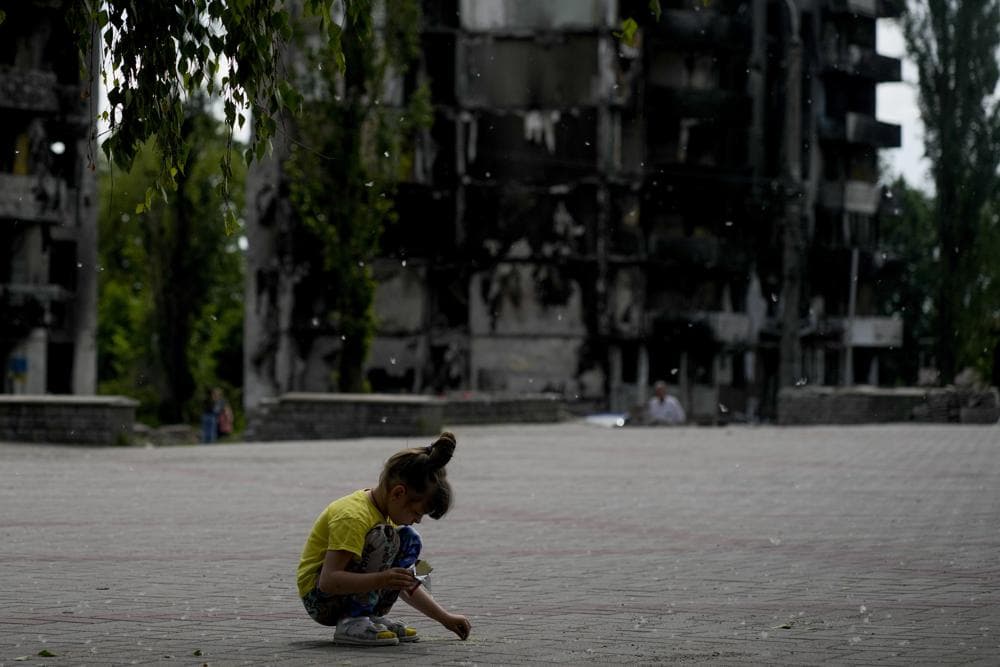ROME – Archbishop Visvaldas Kulbokas, the papal representative in Ukraine, says he is incapable of understanding how “humanity in the 21st century doesn’t condemn war.”
“We have to unite, all over the world, to say that we are against war,” Kulbokas told Crux over the phone Monday. “We take this for granted, yet you look on the internet, turn on the TV, read the newspaper, and it is clear that not everybody condemns war. This in itself is a huge challenge.”
The prelate was speaking after a rally for peace held in Kyiv on Monday, July 11, organized by the European Nonviolent Action Movement. The mayor of Kyiv also spoke at the rally, organized to foster cohesion among European countries under the banner of nonviolence.
“Only with an immediate ceasefire and the start of meetings and negotiations is it possible to end the conflict and work toward the creation of the United States of Europe, with its own defensive army and civilian peace corps,” says the call to action published by this coalition of 30 NGOs.
Kulbokas was quick in clarifying that even though he “wholeheartedly” agrees with the call for a nonviolent action for peace, “it is very important to understand” that the movement didn’t go to Ukraine “to tell Ukrainians that they have to give up arms. This is impossible.”
Ukrainians, he said, need to defend themselves.
Nevertheless, cultural and civil initiatives such as Monday’s, “with a slower but global dimension,” can promote and defend the construction of peace, he said.
“I also appreciated the position expressed by the organizers that they do not in any way want to interfere in the decisions of the Ukrainian people and the government that represents them, on how they intend to defend the country, the lives of their citizens, primarily children, and how they intend to build their future,” Kulbokas said in his remarks.
Speaking about the importance of nonviolent peacebuilding, he voiced a series of questions: “How to build peace? How to build it, when we see that neither the attempts of the world’s political leaders, nor the existence of the UN Security Council, nor the appeals of Pope Francis, the Council of Churches and Religious Organizations of Ukraine, and so many Ukrainian and world religious leaders seem to [bring] no results?”
For peace to be built, he said, it is necessary for political and religious leaders, the media and civil society, to all work together so that the call for peace is heard unanimously.
Reflecting on St. Benedict and his regular examination of conscience, Kulbokas said this is something everyone should do on a daily basis.
“When I realize that, surprisingly, not all of humanity seems united in condemning war and seeking peace, that means that I still cannot say that I have done my part to make it happen,” he said. “That is, I cannot say: my conscience is clear, because I work for peace, while others will deal with their conscience and God. No — because I become co-responsible for the deaths of children, hundreds and thousands of innocent children who have died because of war.”
“Certainly, this is a qualitatively very different responsibility from that of those who started the war, or those who promote or support it,” he said. “And yet, still a responsibility it is.”
Though he acknowledges the significance of Monday’s event, Kulbokas said he’s not naïve enough to believe the event will seal the peace.
“In itself, it is almost powerless, anecdotal, it needs to grow into a truly global movement,” he said. “War is hard as a rock, yet one drop of water after another one, constantly, has the power of breaking that rock. But every single prayer for peace, every action, every dialogue effort, represent those drops.”
When it comes to what every-day Catholics can do to help bring an end to the war, Kulbokas had four suggestions:
- Prayer “is very important, and it must be done, above all, with the heart united to the children who have died in this war. If we pray with all our heart, united to them and their prayer, it becomes infinitely more powerful because they are more innocent than any of us and we know that they are in front of the Father.”
- Humanity has to come together “to say that we are against war.”
- Humanitarian aid, “whenever possible, because humanitarian aid is love for the brother. Here, it is a way of repairing wounds.”
- To continue to think about what else can be done in favor of peace: “I have no answer, but the war shows us that we have failed: I, you Ines, and all of humanity, have failed. We are not capable of ending the war. It is necessary to reflect, to investigate, to think. Because the fact that we have not succeeded does not imply that we should give up looking for ways to build peace.”
Regarding a possible visit by Pope Francis to Ukraine, the nuncio says that he couldn’t add to what the Vatican’s foreign minister had said. British Archbishop Paul Gallagher had said that he couldn’t “rule out” the pontiff being in Ukrainian soil by August.
“Above all, the pope’s physical health will have to be evaluated, so yes, it is not ruled out but the Holy Father and the Holy See will evaluate when it is possible,” Kulbokas said. “It is a desire, but for now we do not know when concretely it can be realized. I hope as soon as possible. I personally hope so.”
Follow Inés San Martín on Twitter: @inesanma











